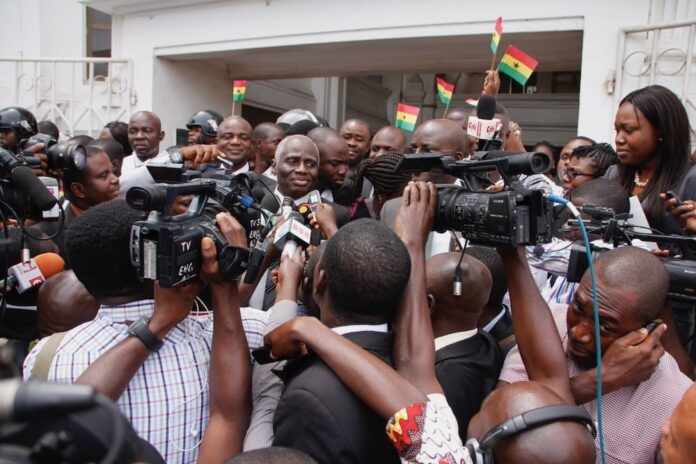The Ghana Journalists Association (GJA) has issued a firm ultimatum to the Ghana Police Service and other state security institutions, warning of a nationwide media blackout on police activities if attacks on journalists are not addressed within seven days.
GJA President Albert Dwumfour condemned what he described as a systematic and rising tide of violence against journalists, calling for “zero tolerance for impunity” in the face of escalating assaults, unlawful detentions, and intimidation.
“The GJA will no longer accept symbolic condemnations without action. If the Ghana Police Service fails to act decisively within the next 7 days, we will announce a nationwide media blackout of all police activities,” Dwumfour stated.
Also Read: 60-40: Afenyo-Markin mocks Mahama gov’t over ‘corruption hypocrisy’
Addressing a press conference on Thursday, July 31, he announced that journalists would be instructed to withhold coverage of police events, refuse participation in press briefings, and suspend editorial engagement with police institutions until meaningful action is taken.
“This is not a threat. It is a necessary action to defend the dignity and safety of every Ghanaian journalist.”
Dwumfour expressed shock and disappointment that repeated attacks have occurred under a government led by President John Mahama, himself a paid-up member of the GJA.
“Are these frequent attacks on journalists happening under a President we can boldly say is ‘our own’? Any attempt to take us back in our pursuit of press freedom will not be accepted.”
The GJA singled out the Ablekuma North by-election violence, where two journalists—Emmanuel Banahene of EIB Network and Salomey Nartey of JoyNews, were physically assaulted by police while covering the event.
“Weeks after a senior police officer was captured on video attacking a reporter, we are yet to see real consequences. Interdiction and internal charges are not enough. Justice must be swift, public, and meaningful,” Dwumfour declared.
The GJA demanded the full prosecution of the officer involved and public disclosure of the identities and status of suspects arrested.
The statement also condemned the arrest and detention of JoyNews journalist Carlos Calony and his cameraman during their coverage of the demolition of businessman Daniel McKorley’s warehouse.
“This is censorship through force. It must be condemned in the strongest terms,” the GJA stated and demanded an official explanation from National Security and the Ghana Armed Forces.
The GJA outlined an aggressive plan of action if no satisfactory response is received within seven days, including: Civil lawsuits will be filed personally against officers who assault journalists; International petitions will be submitted to human rights bodies, the UN, AU, ECOWAS, and UNESCO to block offenders from international assignments; Diplomatic engagement with embassies to revoke visas and blacklist violators; Petitions to security councils demanding internal sanctions and blocked promotions.; and Monthly publication of offenders’ names and photos, labelling them as “Enemies of Democracy and Press Freedom.”
The GJA also raised concern over worsening security in Bawku, Nkwanta, Ashaiman, and Asawase, noting that violence in these areas threatens not just communities but journalists covering conflicts.
Dwumfour appealed to security agencies to adopt “proactive, intelligence-led approaches” and called for deeper engagement with local communities to address root causes.
Urging journalists to exercise caution and uphold ethics, the GJA warned against sensationalism and incitement. “Let us report not just to inform, but to heal, to unite, and to build. The GJA will not shield any journalist who uses their platform to incite violence or spread hate,” he warned.
While acknowledging a recent statement from the Office of the President condemning attacks on journalists, the GJA called for “deeds, not declarations. He stressed that Ghana’s reputation as a beacon of democracy is at stake and warned that symbolic gestures are not enough.
“We will not be quiet. We will not be intimidated. And we will not allow the enemies of press freedom to win,” he said and stressed that journalism is not a crime; therefore, attacks on journalists are attacks on the soul of Ghana’s democracy.


